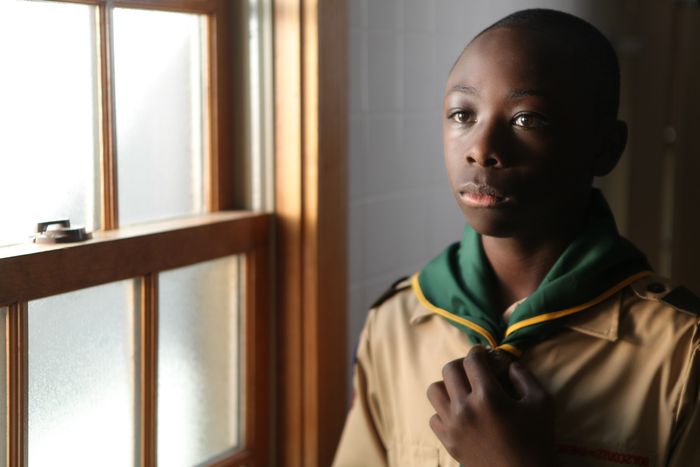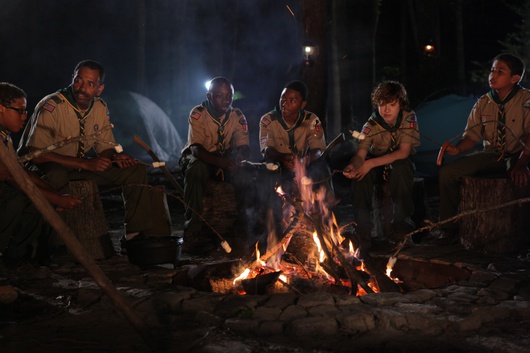
Black boys in film: indie promise?
Published on
Can indie films like Troop 491: The Adventures of the Muddy Lions change the status quo for black boys on camera?
Very few kids' movies feature young black pre-teen boys as the main star, even in so called “black movies”. Black actresses seem to fare comparatively well, think, is there a male-centric equivalent to Keke Palmer’s career trajectory after her success in Akeelah and the Bee? Hollywood has its knickers in a twist over Beasts of the Southern Wild Oscar-nominated actress Quevenzhané Wallis but there is a surprising absence of young black kid actors to join her in the spotlight. In the past few years young black males have cast in adult, niche films. LUV starring Michael Rainey Jr. made Sundance’s 2012 Official Selection. Take London's John Boyega in Brit flick Attack the Block back in 2011. For all its brilliance, Attack the Block was sold to indie moviegoers on a certificate “R” the United States and in the UK you had to be 15 years old to see the film.
Although he is often hated-on in the tabloid press and blogs, Jaden Smith, son of Will Smith, is one of the few black males to portray young black male characters in significant movie releases, so it is telling then, that Troop 491: The Adventures of the Muddy Lions, the first film from African-American director, Patrick Ricks aka Praheme Praphet, 29, explores the struggles of a pre-pubescent middle schooler.
The wide-eyed Tristan Foster played by Kimani Coleman lives in inner-city Richmond, Virginia with his mother, Gloria, a nurse. Straight away we learn that Tristan struggles without a male role model as his mother has to practically drag him to church. His only outlet seems to be is one hobby, drawing, but he’s not that much of a geek, in fact, he’s afraid of the label.
His “friends” led by his best buddy called Cocoa Puffs (King Hoey) have a routine hang shake and constantly practice their swagger, trying to distance themselves from kids who don’t. During the Sunday service local scouts receive their badges in a homiletic ceremony. This gives his mother ideas. Scouts she believes, could save her son. At this point in the film, the writing falters, in the interchange between Tristan and Gloria, she berates him for “hanging with a pack of wolves” after he steals some candy from a store with his friends. These lines are expected and could have been worked over a little more by the director, who also doubles as the scriptwriter, but hey, the kids won’t notice right?
 Much to his chagrin Tristan is inducted into the scouts and predictably, wants to keep it a secret. His tussle with good and evil forces gets stronger. Parable-like movies can descend into cheese extremely quickly, Praheme never allows this. He doesn’t hide the bleak reality of inner city project life. This Howard and Florida State University film graduate has taken time to build complex characters. He allows light-hearted humour to even the pace after Tristan witnesses a murder and his scout values are tested. There is even a cameo appearance by Daphne Reid, who played Vivian Banks in The Fresh Prince of Bel Air. Realist cinematography moves from edgy to soft with the exception of Tristan’s nightmares which appear as events in real time.
Much to his chagrin Tristan is inducted into the scouts and predictably, wants to keep it a secret. His tussle with good and evil forces gets stronger. Parable-like movies can descend into cheese extremely quickly, Praheme never allows this. He doesn’t hide the bleak reality of inner city project life. This Howard and Florida State University film graduate has taken time to build complex characters. He allows light-hearted humour to even the pace after Tristan witnesses a murder and his scout values are tested. There is even a cameo appearance by Daphne Reid, who played Vivian Banks in The Fresh Prince of Bel Air. Realist cinematography moves from edgy to soft with the exception of Tristan’s nightmares which appear as events in real time.
Tristan eventually finds his fraternal family with his diverse scout mates who call their pack the “Muddy Lions” a name that would have worked better as a title.
At the premiere screening held at the British Film Institute a few rows were taken up with young black boys from inner city London. At the end of the film they were whooping and hollering, tugging at the director for his autograph.
Praheme, a former scout himself, says, “Scouting helped prepare me for life, it taught me a lot of values and lessons that I still keep with me today.”
“If I could sneak that into this next generation of kids,” he muses. “Maybe it might help shape some of these young kids lives?” Hopefully his dreams will come true.
Troop 491 was funny, entertaining and relational, a film I’m sure all young boys living in Europe's inner cities will be able to identify with.
However, when asked about his main struggle as a young black filmmaker, his response was immediately, "Distribution." He said, "It’s hard enough to make it, [a movie] it’s even harder to get it out for people to see it."
If Praheme can get past this initial hurdle and Troop 491 gets the attention it deserves, perhaps black boys’ stories will stop being overlooked and they will be able to go to the cinema and see a three dimensional portrayal of themselves on screen.



